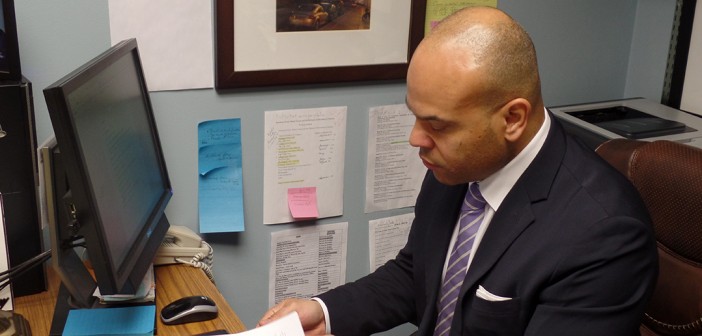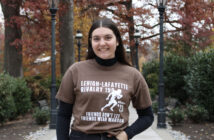Feb. 21 marks the 50th anniversary of the assassination of Malcolm X, a passionate activist who during the civil rights movement spoke on subjects of race and religion. To commemorate this anniversary, Lehigh is hosting the conference “Malcolm X’s World 50 Years Later: Reappraising Race, Religion, and Revolution Today.”
The conference is co-chaired by political science professor Saladin Ambar, who conceived the idea while writing his book “Malcolm X at Oxford Union: Racial Politics in a Global Era.”
“I thought it would be great if Lehigh could host an event, or conference, related to the 50th anniversary of his assassination, on campus,” Ambar said. “It really came out of my research and a sort of moment related to a historic anniversary.”
Ambar approached James Peterson, a professor and the director of Africana studies and now a co-chair of the conference, with the idea and submitted a proposal to the College of Arts and Sciences in the summer of 2013.
“The main idea was to get scholars from around the country and, really, around the world whose work speaks to the life and political thought of Malcolm X to come and present their work, present their thoughts 50 years later; to take three components of Malcolm X’s life, the ideas of revolution, race, and religion, and to discuss the ways in which the world has changed on those fronts, the ways in which it might be better on those fronts,” Ambar said.
Malcolm X has impacted Ambar’s life since he was growing up.
“I had grown up in New York City in the 1980s and had been deeply influenced by both Islam and by Malcolm X as a historic figure,” he said. “I, like a lot of black youth at that time, changed my name legally, I became Muslim, I was one of that group of people from that hip-hop generation who was deeply influenced by the Muslim movement (and) by Malcolm X.”
Ambar’s work is primarily grounded in the U.S. presidency, so he wasn’t inspired to write Malcolm X at Oxford Union until 2010 while teaching a course on black political thought. He was struck by how dynamic Malcolm X’s speech at Oxford in 1964 was, seeing it as a moment in global race relations and civil rights that should be explored. His research included examining Malcolm X’s travel notebooks and conducting many interviews with those who knew him in Harlem, the UK, and Paris.
This research gave Ambar a greater appreciation for who Malcolm X was, especially towards the end of his life.
“He was more of a humanist in the last year of his life, but equally strong on questions of race and human rights,” Ambar said. “The research added depth to my understanding of who he was.”
He hopes that participants in the conference will also gain a more nuanced and sophisticated view of Malcolm X than what is traditionally presented in popular culture. Ambar himself will speak at the conference about “taking Malcolm X seriously.”
“By ‘seriously’ I mean not just as someone who’s a scary figure from the 1960s or a militant figure from the 1960s, but as someone who had something serious to say about issues of justice, race, and human rights around the world,” he said.
The importance of having this conference on campus goes beyond just discussing a historic figure.
“It’s not secret that Lehigh has struggled with issues of race and inclusion in it’s history and over the past several years we’ve taken some strides to reverse that trend,” Ambar said. “I think this conference is an opportunity to do so as well, to invigorate discussion about a historic person, yes, but for the purpose of examining our own times, our own lives, the way we interact with one another, and to engage the topic of social justice and race in a way that is going to really encourage discussion.”
The conference will be held Feb. 17-19, featuring keynote speakers, as well as paper presentations and panels, giving students and community members opportunities to participate and interact with scholars. Registration and more information about the speakers can be found at www.malcolmx.cas2.lehigh.edu.






Comment policy
Comments posted to The Brown and White website are reviewed by a moderator before being approved. Incendiary speech or harassing language, including comments targeted at individuals, may be deemed unacceptable and not published. Spam and other soliciting will also be declined.
The Brown and White also reserves the right to not publish entirely anonymous comments.